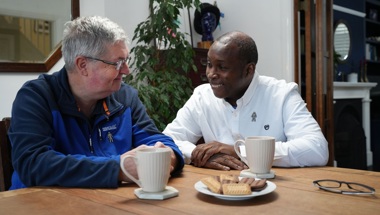Wellbeing Hub
Being diagnosed and living with prostate cancer can be hard to deal with. It can affect you physically, but also mentally and emotionally. We have created this wellbeing hub to help support you in looking after your emotional, mental, and physical wellbeing.
The information found in this hub is for anyone affected by prostate cancer – whether you have just been diagnosed, are having treatment, or are living with prostate cancer and the side effects of treatment. Your loved ones might also find this information helpful.

Mental and emotional wellbeing
Being diagnosed and living with prostate cancer can affect your mood, thoughts, and emotions. We discuss the mental and emotional impact of prostate cancer, and what can help.
Mental and emotional wellbeing

Common thoughts and feelings
Everyone reacts differently to being diagnosed and living with prostate cancer. We discuss some of the common thoughts and feelings you and your loved ones may experience.
Common thoughts and feelings

Tips on dealing with anxiety and stress
Anxiety and stress can have a negative impact on your mental health. We discuss tips that can help you manage your stress and anxiety.
Tips on dealing with anxiety and stress

Physical wellbeing
Looking after your physical wellbeing is not only important for your physical health. We discuss the positive impact physical activity can have on your mental, emotional and social wellbeing.
Physical wellbeing

Support for friends and family
This page is for anyone who is close to someone with prostate cancer. It looks at ways you can support someone with prostate cancer, where to get more information and how you can look after yourself.
Support for family and friends

Time to talk. Prostate cancer and men’s mental health
In this video, Andy and Michael talk about the impact prostate cancer can have on men’s mental health. They share their own personal experiences, whats helped them get through it, and give advice to other men navigating prostate cancer.
Time to talk. Prostate cancer and men’s mental health

Edward's story: The emotional roller coaster of prostate cancer
Here Edward shares his experience, the emotional challenges he's faced and his journey with counselling.
Edward’s Story

Nigel's Story: Recovering physically, mentally and emotionally
Here, Nigel shares his experience of navigating prostate cancer and anxiety, including what’s helped him manage and reclaim control of his life.
Our Specialist Nurses
Our Specialist Nurses are here if you have any questions, or just need someone to talk to. Call 0800 074 8383, or chat to them online.
Our Specialist Nurses
Living with and after prostate cancer
This booklet is for men living with and after prostate cancer. It’s also for men who are having their prostate cancer monitored, rather than having treatment. Your partner, family and friends might also find it useful.
Living with and after prostate cancer


